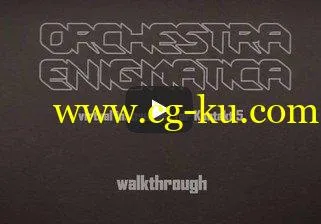KONTAKT – 1,39 GBOrchestra Enigmatica is an instrument based on samples from vintage analog “orchestral” synthesizer, Siel Orchestra from 1979 (first version).
There are some additional voices created with 1984 Sequential Circuits Six-Track.
The instrument has 16 voices, which can be processed individually by adding filters, effects and modulators and then combined to create new sounds.
The samples are fairly detailed to preserve quirks of an ageing synthesizer.
Sustained sounds have been looped by hand, without crossfading to preserve the original vibe.
IN DETAILOrchestra Enigmatica comes with multi-arp function, an advanced arpeggiator, which can populate up to eight arpeggio patterns simultaneously from a single chord.
Arpeggios can play different voices, run at different rates and pattern notes can be transposed with optional snap to scale function.
Additionally each arpeggio has its own velocity and pitch sequence.
Arpeggios can run in parallel or can be sequenced, as in “x steps of arp 1, y steps of arp 2”.
Arpeggiator programs can be saved to a keyswitch and recalled while the sequencer is playing.
Also there’s keyboard split function, you you can play arpeggio with one hand and sustained notes with the other hand.
THE CONCEPTOrchestra Enigmatica is vintage orchestral synthesizer instrument paying homage to early synthetic emulations of traditional acoustic instruments.
Those sounds mostly required a vivid imagination and a kind of positive enthusiastic approach to hear the similarities to emulated instruments.
However, as the time passed, they grew a charm of their own, becoming a different type of classical instrument.
While ‘Orchestra’ stands for a kind of historic exhibit, ‘Enigmatica’ hints a bit of experiment and innovation. The instrument features uniquemulti-arpeggiator function. It can populate several arpeggio patterns from the same chord, which can run at different rates, different rhythms anddifferent algorithms.
Arpeggios can run simultaneously and/or be mixed together creating complex note patterns from a simple chord.
MULTI-ARPMulti-arpeggiator is a unique feature of Orchestra Enigmatica, while it may look enigmatic at first sight, it’s not really complicated.
It just offers a lot of options.
The basic idea is to make it possible to run several different arpeggios originating from a single chord.
There are 8 arpeggiators which can be stacked (play simultaneously) or queued (play a number of steps one after another).
The instrument has keyboard split functionality, part of keyboard can be used to trigger arpeggios and at the same time you can play a melody using the other region of the keyboard.
Arpeggiator region is colored green on virtual keyboard and non-arpeggiated region is colored blue.
Each arp has “OFF” option as a mode of operation.
When all arps are off, the whole key range can be played normally.
You can also turn the whole arpeggiator engine on/off without disabling arps one by one, using arp on/off switch.
Normally when you press a key in arp region only the arpeggio can be heard.
However you can play both, arpeggio and sustained notes in the arp region, when you turn on “thru” switch.
You can use the switch to turn sustained sounds on/and off while holding a chord.
PRESET BROWSERThere’s preset browser in “presets and options” panel, it contains numerous example presets and can be used to memorize multi-arp configuration, to use later in another project.
The browser offers 300 memory slots which are being saved externally, so if you save a preset it will be available in any instance of the instrument.
Browser presets are stored in nka files in “presets” folder, which should be located in the same place as the instrument patch file (nki).
If “presets” folder is missing, the browser won’t work.
Browser presets are loaded from nka files.
Unlike loading a keyswitch preset, presets stored externally do not load “instantly”, however the delay should not be noticeable in practice.
Browser preset can also be loaded as the sequencer is running.
You can scroll the preset list using the scroll slider or scroll buttons, whichever way you find more convenient.
MIDI OUTPUTKontakt can output generated notes to MIDI, so any script sequencer can be used to control another VST or hardware instrument.
If you would like to use it, make sure to enable generating MIDI messages.
Open Kontakt’s “options” and look under engine tab, “send MIDI to outside world”, “script generated notes” should be selected in drop-down menu.
Also disable “diverge” function in multi-arp “options” panel, it will change actual note numbers randomly, so the output MIDI sequence will be random.
Kontakt MIDI output is single channel.
If you want to export multi-arp patterns having different arps in separate channels or configuring VST MIDI output is troublesome in your DAW, you can use included MIDI recorder.
Recorder is using Kontakt’s functionality to export midi clips by drag’n’drop.
It records instrument performance internally, then you can drag’n’drop the recording directly to DAW, or to midi file.
REQUIREMENTS: full version of Kontakt 5.
6.
6 or newer.
